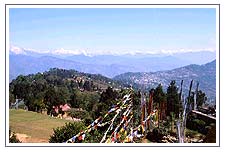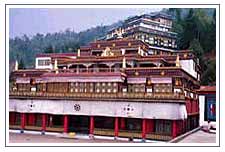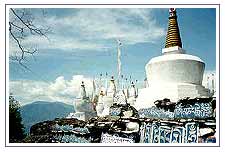
Gangtok
- Travel to Gangtok city in India Himalayas which is full of amazing
sights, blessed with all the natural bounties, surrounded by towering
peaks, trekking and hiking trails, a popular honeymoon destination and
known for its immense natural beauty all over the world.
Duration: 06 Nights - 07 Days
Duration: 07 Nights - 08 Days
Duration: 08 Nights - 09 Days
Duration: 09 Nights - 10 Days
Duration: 11 Nights - 12 Days
Duration: 05 Nights - 06 Days
Gangtok
| Location : |
East District, Sikkim |
| Altitude: |
1,870m |
| Significance: |
Capital Of Sikkim. |
| Best Time To Visit: |
Mid- February To May End &
Mid - September To December |
Gangtok which, at an altitude of 1,870m, is Sikkim's fairytale capital in
the clouds, balances precariously on steep mountain slopes, Surrounded by
lush rice terraces, swifts flowing rivers and distant snow views, Gangtok
has become the political and economic hub of Sikkim with its population
having increased from 15,000 to 50,000 since it joined India in 1975.
Places of Interest in Gangtok
Institute of Tibetology:
About 1.5 km (nearly a mile) from downtown Gangtok is the Institute of
Tibetology, an organisation dedicated to furthering Tibetan studies,
Buddhist philosophy and region. It attracts scholars from all over the
world. It houses a rare collection of 30,000 books, Tantric documents, rare
manuscripts written in gold on the bark of a poisonous tree, antique thanks
and 200 icons, all prized objects of art for the Buddhist world. The
Institute has won both national and international acclaim.
 Tsuk-La-Khang Monastery:
Tsuk-La-Khang Monastery:
This monastery is located in the palace premises near the ridge in Gangtok.
It is two storied and was used during royal functions like weddings and
coronations. The Phang Labsol and the Lossang festivals are celebrated in
the ground adjacent to the monastery once-every year with the performance of
the 'Chhams' or the masked dances.
Dul-Dul Chorten & Jhang Club Chortan:
Sikkim has commemorated, with stupas, both the Buddha and one of his
followers of today. Near the Deorali bazaar, are two exquisite stupas, the "Dul-dul-Chorten",
was built to commemorate the victory of good over evil; the "Jhang Club
Chorten" was built to perpetuate the memory of a great spiritualist of
today. Thrul-Shik Rinpoche an ardent devotee of Buddha and one of his best
interpreters died in 1962, the stupa immortalises rimpoche in the land of
his birth.
Government Institute of Cottage Industries:
Just outside Gangtok is the Government Institute of Cottage Industries
which produces crafts in authentic Sikkimese designs from the whole state.
Hand woven Tibetan carpets sprout dragons in natural dyes, Sikkinese-style
tables called "Choktse" are expertly carved and richly coloured in
red and gold. Hand-made rice paper is also produced. Talented children are
taught the basics of knitting, weaving, leather work, basket making, mask
making and painting of religious and secular themes.
Lal Bazaar:
On Sunday, Gangtok' s Lal Bazaar is a melody of colour. Various ethnic
groups from different villages gather to haggle, bargain, gossip or just
sell their wares. The marketplace rings to a cacophony of sound-the babble
of ethnic tongues, the chiming bells of the Indian sweet shops the whining
of a beggar, the chanting of prayers, the advertising of the Sikkim lottery
and the blaring Hindi love songs from the Denzong cinema.
Nearby Attractions from Gangtok
Rumtek
Monastery:

About 24 km from Gangtok, by meandering roads through emerald green rice
terraces, lies Rumtek, the main monastery of Kagyud or 'Black Hat' sect of
Tibetan Buddhism. Built in 1959 by His Holiness the 16th Reincarnated Gyalwa
Karmapa, head of the Kagyud sect, it is a replica of Tsurphu Monastery from
the Kham region of Tibet. He was forced to flee the Chines capture of Tibet
and physically carried unique religious treasures with him.
Pemayangtse Monastery:
Pemayangtse, the Sublime Lotus monastery, lies west of Gangtok. Built in
1705 it is Sikkim's second oldest monastery and second most important. This
ancient monastery is the headquarters of the Nyingmapa Buddhist sect of
Sikkim. Inside are great murals filled with thousands of deities from the
Tibetan Buddhist pantheon. On the top floor is a wooden sculpture, the
Zandog-Palri, which depicts the heavenly abode of Guru Padmasambhava.
Tashiding Monastery:
Tashiding Monastery was built by Pediwangmo, the half sister of Chogyal
Chador Namgyal in 1716. According to legend, Guru Padmasambhava shot an
arrow amd meditated on the spot where it had fallen. Tashiding was
constructed on that spot, perched on a hilltop surrounded by deep forest and
two rivers, the Ratong and Rangit. Though this monastery is second only to
Pemayangtse, it houses the sacred chorten, Thongwa Randol. According to
ancient belief, just a glimpse of the chorten cleanses one of all sins.
Yuksom:
Yuksom, in the west of Gangtok, is an historical town set amidst pristine
hills and lakes, where the first King of Sikkim was crowned in AD 1642. From
here the adventurous can trek to Dzongri and Gochi-La. The reward for
undertaking this strenuous excursion is an unequalled first-hand experience
of the high Himalaya peaks, glaciers and icefalls. A superb panorama of the
Eastern Himalayas awaits the trekker.
 Mangan:
Mangan:
Mangan is the main adminstration and market centre for north Sikkim where
the locals sell their apples, oranges and cardamom. Dzongu is a forested
region fed by two important rivers, the Teesta and Tolung, in the shadow of
Mt Kanchenjunga and the icy castle of Mt Siniolchu, considered to be world's
most beautiful peak. The antique Tolung Monastery in Mnagan can be reached
through dense jungle and steep hillsides. The monastery is a repository of
Sikkim's treasures including horse saddes, old thankas and thigh bone
trumpets.
Adventure Sports in Gangtok
Trekking:
Great tracts of virgin forests and deep river valleys, offering views of
ancient monasteries such as Pemayangtse and Tashiding and the attractive but
rapidly developing hamlet of Pelling, characterize the beautiful region of
Western Sikkim. The old capital, Yoksum, lies at the start of the trail
towards Dzongri and Kanchenjunga.
On the far west, along the border with Nepal, the watershed of the
Singalila range rises along a single ridge, with giants such as Rathong and
Kabru culminating in Kanchenjunga itself. Although only one high altitude
trek is currently available, several low altitude treks, free from trekking
restrictions, provide tremendous opportunities for trekkers to enjoy the
terraced landscapes, waterfalls and forests.
How To Get There
Air
:
The closest airport is at Bagdogra, which is 124-km from Gangtok and
connected by air with all-important Indian Metros.
Rail:
The nearest railhead is at New Jalpaiguri, which is 125-km from Gangtok.
NJP is well connected with all major cities of India.
Road:
Gangtok is connected with Darjeeling, Kalimpong and Siliguri by the
national highway 31 A. the Sikkim nationalised transport plies regular bus
services between Gangtok and Siliguri and within Sikkim. Private buses,
jeeps and taxis are also available from Siliguri and Bagdogra.
DISTANCES FROM MAJOR CITIES
»Bagdogra: 124-km
»Siliguri: 110-km
»Kalimpong Via Tista: 75-km
»Jalpaigurhi: 125-km
»Darjeeling:
94-km
»Singhik: 72-km
»Tsongo: 40-km
»Lachung: 126-km
»Yumthang: 149-km
Travel Packages of Gangtok
|
Duration
: 13 days
Places Covered : Delhi - Bagdogra -
Darjeeling - Pemayangste - Yuksum - Kecheoplari lake - Yuksum -
Gangtok - Lachung - Yumthang - Gangtok - Bagdogra - Delhi |
|
|
Duration
: 6 Nights - 7 Days
Places Covered :Bagdogra -
Indo-Tinet-Border - Pemayangtse - Gangtok |
|
|
Duration
: 05 Nights - 06 Days
Places Covered :Bagdogra - Darjeeling
- Gangtok - Bagdogra |
|
|


 Tsuk-La-Khang Monastery:
Tsuk-La-Khang Monastery: About 24 km from Gangtok, by meandering roads through emerald green rice
terraces, lies Rumtek, the main monastery of Kagyud or 'Black Hat' sect of
Tibetan Buddhism. Built in 1959 by His Holiness the 16th Reincarnated Gyalwa
Karmapa, head of the Kagyud sect, it is a replica of Tsurphu Monastery from
the Kham region of Tibet. He was forced to flee the Chines capture of Tibet
and physically carried unique religious treasures with him.
About 24 km from Gangtok, by meandering roads through emerald green rice
terraces, lies Rumtek, the main monastery of Kagyud or 'Black Hat' sect of
Tibetan Buddhism. Built in 1959 by His Holiness the 16th Reincarnated Gyalwa
Karmapa, head of the Kagyud sect, it is a replica of Tsurphu Monastery from
the Kham region of Tibet. He was forced to flee the Chines capture of Tibet
and physically carried unique religious treasures with him.  Mangan:
Mangan: